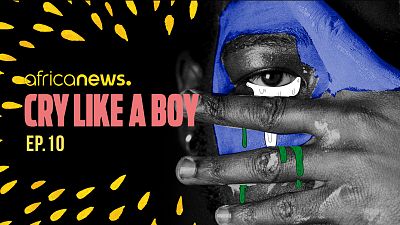Lesotho
160 kilometres away from South Africa’s Johannesburg, there is a place in Lesotho almost entirely populated by women and children after they were left behind by their husbands and brothers.
This place with no men in Lesotho is called the Thaba-Tseka district, “ No man’s land”.
The men left home to go and work in clandestine mines in South Africa, risking their lives. Brave and strong, they suffer silently and never open up to their families about the hardships of working in dangerous conditions to put food on the table.
It is considered normal for men across the world to hide their feelings and not talk about their weaknesses.
What are the solutions to ending this toxic masculinity and a misplaced pride?
In this latest episode of Cry Like A Boy we discover the consequences of being a breadwinner at all costs and how this phenomenon could be stopped.
Like this episode? Share your thoughts on how you have challenged your view on what it means to be a man using the hashtag #CryLikeaBoy. And if you are a French speaker, this podcast is also available in French: Dans la Tête des Hommes.
Please do not hesitate to listen and subscribe to the podcast on euronews.com or Castbox, Spotify, Apple, Google, Deezer, and give us a review.
TRANSCRIPT | BANNA BA MAMAENARA IN LESOTHO: NO MAN'S LAND
Danielle Olavario: We are at a party in the middle of nowhere. A bunch of men are dancing. Some of them wear balaclavas on their heads, others wear sunglasses. Most of them are bare chested.
They dance inside an open mining pit. A very narrow one that keeps them stuck around the same circle. The occasion is uncertain as they jam up to famo, a local music genre.
It looks like partygoers on cloud nine - except something is odd.
These men are brandishing guns in their hands, as if high on weed. They’re zama zama. Being organised in gangs, they often carry guns.
If you saw the video, you would think of a narco fiesta, except that we are in an illegal mine in South Africa, 160 kilometres away from Johannesburg.
Hundreds of kilometres away from this party, in another country, Lesotho, there is a place populated almost entirely by the women and children these men left behind.
Almost all of them have left to go and work in clandestine mines in South Africa, in very dangerous conditions. South Africa is a much richer country that surrounds Lesotho and has plenty of minerals underground.
This place with no men in Lesotho is called the Thaba-Tseka district.
One of the villages in Thaba Tseka where the illegal miners can afford to build modern houses for their families.
Villages in this remote area are hard to spot. They are hidden amongst green hills and mountains.
Here, some houses are made of rocks, some are covered in sheet metal. But there are some houses that look more modern, built with better material.
They belong to the zama-zama, a local word to call the illegal miners, the same illegal miners who were waiving their guns in the air, earlier. Sometimes they are organised in gangs and are getting paid directly with weapons, instead of cash.
Boys being boys at its very finest.
Danielle Olavario: Welcome to Cry Like a Boy. My name is Danielle Olavario and I am a journalist at Euronews.
Cry Like a Boy is an original Euronews series and podcast that explores how the pressure to be ‘a man’ can hurt families and societies. Stay with us as we travel across the African continent to meet men who defy centuries-old stereotypes.
This is the second episode of our series on the Banna Ba Mamaenara, or “men from the mines”.
In our previous episode, you heard about men in Lesotho who gave up their dreams to work in the mines abroad. If you haven’t listened to it yet, you can find it here.
Today, we will explore the consequences that being a breadwinner at all costs brings about and we will also talk about solutions.
When men leave to work in the mines, some of their spouses migrate to South Africa to be employed as domestic workers. Few of them stay, mostly grandmothers.
They depend on the handouts of good samaritans for survival.
Elsewhere in these villages, newly-widowed single mothers struggle to put food on the table. Like ‘Matśepiso Talla.
She is 34-years-old but looks younger. She has short dark hair and a bright, oval shaped face. Her slim body figure is covered in a long, pink gown.
She comes from a village called Methalaneng.
Her husband Thapelo “Mafutha” Talla started to work in an illegal diamond mine in 2012.
‘Matśepiso Talla: He would always discuss this matter and said: "I am now a married man. I should not be bothering my parents with my needs or those of my wife. I have to look after my wife."
Danielle Olavario: Sometimes he spent more than a year away from home, and used to spend up to six months per year underground, selling food and goods to illegal miners. No matter what your job is underground, you are referred to as a zama zama.
‘Matśepiso Talla: My husband was leaving for work, and I knew that he would give me something at the end of the month or even before the end of the month. I wanted to be like everyone else and have a provider.
Danielle Olavario: ‘Matśepiso Talla used to wait for him. Like Penelope waited for Odysseus while he was absent for duty.
Almost five years passed by. In 2017, the couple was refurbishing their house. As they just had a second baby, they were expanding their home.
She had to move out temporarily because of the ongoing construction work. They paid everything with the money her husband was sending her from the mines.
One day, on the 4th of December 2017, ‘Matśepiso was sitting in a rented place in Maputsoe, a small town in the north of Lesotho.
From a distance, she saw a close friend of her husband’s arriving.
‘Matśepiso Talla: I was breastfeeding my child when he arrived. He said to me “Senki”.
Danielle Olavario: Senki was her nickname from when she was a child.
**‘Matśepiso Talla: **I replied and said “yes”. He was drunk. He is a heavy drinker. He said, “do you know that they have shot Mafutha, that they have killed him?” Thirteen bullets. I was told that he was shot with thirteen bullets.
Danielle Olavario: Today, Matśepiso Talla lives in a house with ten rooms with her two children. The house is made of bricks and clay tiles, top quality building materials around here. But her husband is no longer here, with her and the kids.
‘Matśepiso Talla: My husband was under a lot of pressure to go and work for his family. He died working for his family.
Danielle Olavario: Pascalinah, our reporter on the ground explains how these men barely survive this deadly work:
Pascalinah Kabi: These men are under a lot of pressure, and the work is very dangerous, they often die before they can make it home. It's very common around here. In 2016, one village in this district called Liseleng lost nine of its men in one go.
Danielle Olavario: Fourteen villagers in neighbouring Ha Noko suffered the same fate.
Moshoeshoe Moeletsi lost someone there too. He will turn 60 in March. He is from Ha Noko and lost his nephew in an illegal mine. He describes him as a “trusted breadwinner for his siblings”.
Moeletsi went to look for his nephew’s body only to find it in a university lab "at the institution where medical doctors are taught about a human body".
Pascalinah Kabi: He told us that all young boys around here “no longer look for safe, formal employment after finishing school, they all go to those illegal mines”. He has two sons, and he is afraid they will follow this path too.
Moshoeshoe Moeletsi: I do fear they may go. Boys will always be boys and they may be interested in working in the zama-zama when they see others making a lot of money. The young one, who is a taxi driver, works for someone who is a zama-zama. People usually mock my son for working for another man instead of going there to get more money for himself. Talks such as this one may push him to go there.
Danielle Olavario: Pascalinah, our reporter in Lesotho, is the daughter of a miner. For this reason, this story has a special place in her heart.
Pascalinah Kabi: My father began working in the mines in 1969. At the time, he was just 22-years-old. Usually he came home once a month, but some other years, he would visit us for a weekend and six months. I fondly remember how we used to wait for my father to knock on the door until late in the night, eager to see what goodies he had promised. Besides our usual snacks that he would buy from the shops, he bought a special powdered milk, which was only served in the mines. Only children of mine workers had access to that milk. It was especially sweet. We had some sort of pride that we have something special that other children didn't have access to.
Danielle Olavario: Pascalinah remembers that - as long as her father was working in the mines - there was always food on the table.
Before 1996, when he was retrenched from the mines, life was overall good for her and her family.
Pascalinah Kabi: Before that, we never lacked anything. There was always food, money for school fees, medical care, clothes and other family necessities. And when he retired for at least a year, we didn't like anything because he had money. But the next year, in 1997, it was the hardest for my family. Watching my father staying at home was heartbreaking because all he knew was mining.
Danielle Olavario: Just like the five men we met previously, Pascalinah’s father suffered silently this emptiness he felt after having stopped working in the mine. He also never opened up with his family about the hardships of being the only one in charge of bringing food to the table.
It is normal for men around the world not to talk about their weaknesses, as believes Joanna Syrda, the author of a 2019 study about the pressure of being a breadwinner.
She says there are not enough people out there talking about the issue.
Joanna Syrda: I think it would be much healthier if men also talked about the stress that they might be feeling of being a sole breadwinner and kind of opening to that conversation.
Danielle Olavario: Remember the five men we have met in the first episode, in the shadow of a pine tree? Their leader, Thabangiso Matsora, now organises support groups for miners after having retired from the mines.
Despite being big and strong men, doing one of the toughest jobs, miners are confronted with violence on a daily basis.
Living in a closed environment with dozens of men for months on end they suffer from beatings, psychological pressure, but also harassment and sexual violence.
But what happens in the mines stays in the mines.
Most of the ex-miners don’t feel comfortable sharing openly these kinds of experiences, nor their feelings out of shame or beliefs that the things that they had to endure make them less of a man.
Listen to Thabang Matsora.
Thabang Matsora: We believe that these are issues that should not be discussed because rightly speaking, this should have not been done to anyone.
Danielle Olavario: If they come back or refuse to work in the mines, their families reject them. Not being the breadwinners makes them less of a man.
And the same happens when the money runs out. If you can’t provide for your family, what kind of man are you?
Without the ability to generate income, Thabangiso says men turn into “herd boys in their families”. They are emasculated in the eyes of their wives.
But there’s still hope for these men.
Mamohlomi Letlailana is the secretary-general of the ex-miners association in Maseru, the capital of Lesotho.
She set up support groups for ex-miners across the country. She encourages them to break free of the popular Lesotho proverb “men do not cry”. Monna o tśoana le nku ha a lle, just like a sheep, men don’t cry.
Mamohlomi Letlailana: What a cruel proverb which says just like a sheep, man does not cry. It hurts me because in most cases men don't share their sorrows. In most cases, men will not say anything even if they are hurt. This denies them a chance at being assisted in times of need.
Danielle Olavario: She says the solution goes back to that brotherhood that they build as miners.
Mamohlomi Letlailana: The biggest help is to go to their communities and address them through public gatherings. We assisted men by forming only-men support groups to give them a safe space to share their problems and see how they can overcome them. This helped a great deal. If they experience problems in the family, they will share them during support group sessions.
Danielle Olavario: Have you ever heard of a woman miner? In fact, it’s an industry with 85% men, which leads to some obvious toxic masculinity issues.
Breaking free from the “man box” is hard, especially in this traditionally male-dominated sector.
Those who work in this industry, like the five former miners we met earlier on in this episode, are struggling to come to terms with their new lifestyles of having to stay at home and help to raise their children.
They see coming home for good, or retiring from the mines, as loss of their masculinity. They fight to hold onto their manhood, literally. If not beating their wives, they drink alcohol to demonstrate that they remain real men despite their new, foreign normal.
How miners behave as fathers and husbands, back home, does matter.
Niall Hanlon: Those dominant ideals of masculinity that exist in society that align men with holding power in the world are very much about power, of course. But they are also about being carefree. They are also about not having to do caring work.
Danielle Olavario: The voice you just heard belongs to Niall Hanlon, a Lecturer in Social Care at the Technological University of Dublin. He published in 2012 a study in Ireland called Masculinities, Care and Equality. He stresses how care is not really part of the narrative of what it means to be a man. Anywhere in the world.
Niall Hanlon: There is a kind of a privilege, I suppose, associated with and not even having to really reflect on that, that women still take on the majority of caring in society.
Danielle Olavario: The men Prof Hanlon met for his research in Ireland expressed their regret for not spending more time with their children when they were younger.
But with children comes even more pressure, for breadwinning men. Anywhere in the world.
Niall Hanlon: When men have young children that they actually invest more in their career than in their children because they feel like now that they've got a child and a family that I need to be able to provide for them adequately. So the caring role gets shunted over in many ways, which in itself can create a lot of tensions in a family.
Danielle Olavario: There are indeed other ways to be a man.
Teaching this to those doing risky jobs can lead to saving more lives.
This is especially true in the mining industry. The first step is making them aware that masculinity can be performed differently.
A man doesn’t have a duty to be tough.
As expert Dean Laplonge puts it in his book So you think you’re tough? Getting Serious about Gender in Mining, “research has shown a direct link between practices of masculinity and safety. Men are taught to behave in ways that are at odds with staying safe.
"Men are encouraged to do things that will expose themselves as strong and invincible even if it means taking risks to achieve this exposure. This is how men show themselves to be 'real men'. The mining industry can therefore further improve its safety record by driving changes in the way its male employees think about and do gender”.
Laplonge specialises in gender cultures in male-dominated industries. He gets strange looks and giggles when he visits the mines and only has a salad at lunchtime barbecue. Miners call it "a plate of pooftah food”. Pooftah is a British slang word for gay.
He says part of his motivation for investigating gender issues in this field is that he “never wants to have to comfort another crying man as he reflects on the devastation caused to his life and to his family as the result of his career in mining.”
Back in Lesotho, the brothers in darkness are in fact finding the solution in that brotherhood.
These questions are finally being raised thanks to support groups teaching the miners how to talk through their experiences.
Pascalinah Kabi: Hearing stories from the miners that I came across when I was working on this podcast made me realise the hardships, the misery that these men have to go through for their families ...From the stories they told me, these men, my father included, would not have survived a day in the mines had it not been a strong bond of brotherhood amongst them. These miners may not be blood related but they share a strong bond of brotherhood. It helps them soldier on even in difficult times, but they also compete amongst themselves, about who buys their wives the most expensive clothes. A little competition never hurt anyone, they say
CREDITS:
This was Cry Like a Boy. As we usually do, in the next episode we will have a conversation with a guest from Europe and a guest from Africa about the story you just heard. If you’re new to the series, check out our story on the Abatangamuco in Burundi and the Googji-gen in Senegal. Visit our website for more original content, videos and opinion pieces. I, Danielle Olavario, will see you on our next journey.
In this episode, we used music by Selimo Thabane. You can check out his work at selimothabane.org and follow him on Facebook, Instagram and YouTube as Selimo Thabane.
Share with us your own stories of how you changed and challenged your view on what it means to be a man. Use #crylikeaboy. If you’re a French speaker, this podcast is also available in French: Dans la Tête des Hommes.




















Go to video
What to know about a standoff between police and illegal miners at a South Africa mine
00:45
Ramaphosa calls for peaceful resolution to illegal miner standoff
Go to video
South Africa: Ramaphosa urges safe resolution in Stilfontein Mining standoff
Go to video
Mali: Director of Australian gold company arrested
Go to video
8 miners dead, 1 missing after a mine collapse in Zambia
01:26
UN: Southern Africa faces worst hunger crisis in decades due to El Niño